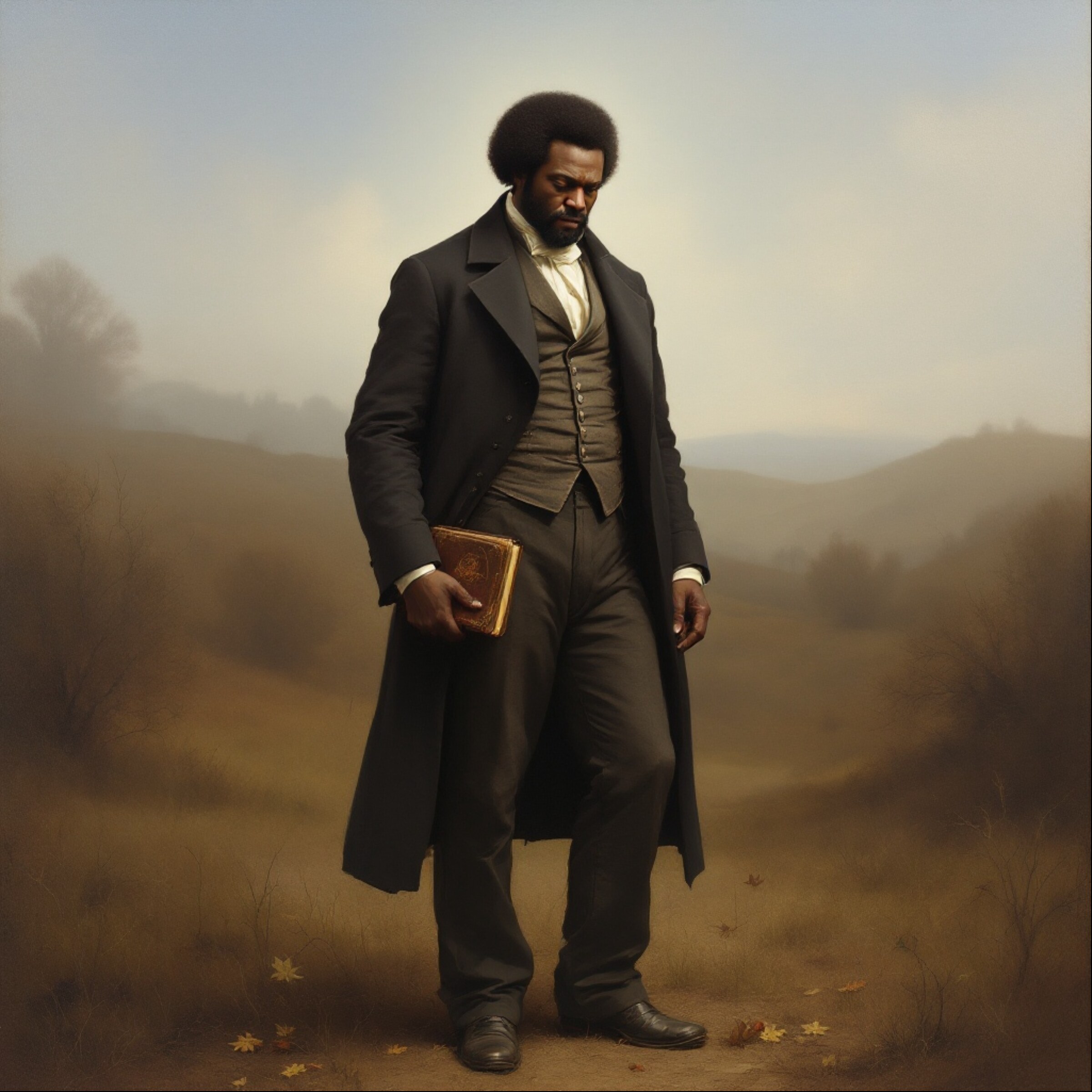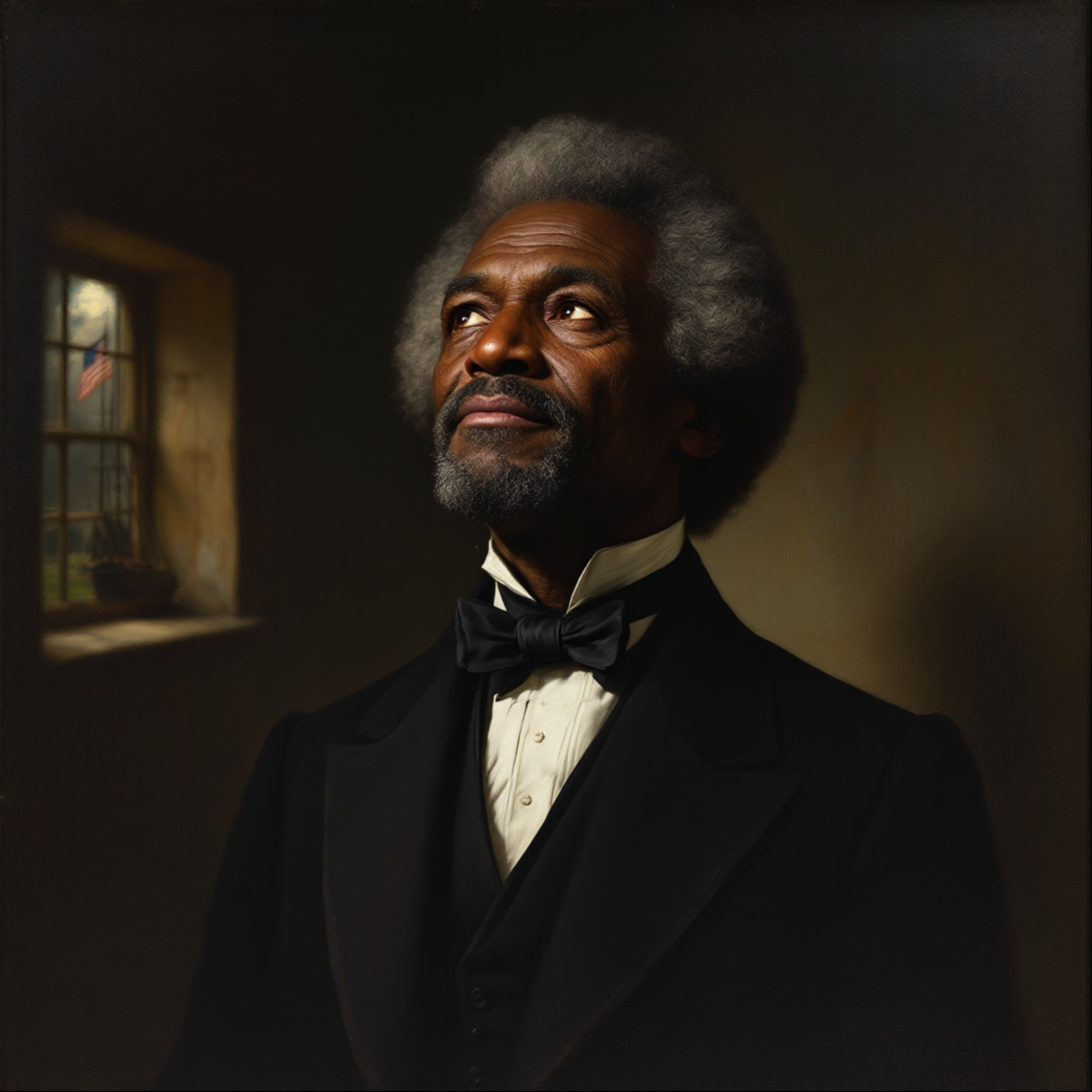Frederick Douglass: American Hero Born in Talbot County, Maryland
Learn more about a true American hero. Frederick Douglass was born Frederick Augustus Washington Bailey in February 1818, in Talbot County on the Eastern Shore of Maryland. He stands as a monumental figure in the narrative of American freedom and equality, a beacon of hope and resilience against the darkness of oppression. Born into the shackles of slavery, his indomitable spirit and eloquent voice transformed him into one of the most powerful advocates for human rights in history. Through his passionate speeches and groundbreaking writings, Douglass not only challenged the status quo but also inspired generations to pursue justice and equality. This article delves into the profound legacy of Frederick Douglass, exploring how his life’s work continues to resonate today. Join us as we unveil the impact of a man who transcended his time and left an indelible mark on the fight for freedom. Discover how Douglass’s unwavering commitment to truth and justice serves as a powerful reminder of the ongoing struggle for equality in our society.
Unveiling the Legacy of Frederick Douglass: The Voice of Freedom and Equality
Early Life and Struggles
Frederick Douglass was born Frederick Augustus Washington Bailey in February 1818, on the Eastern Shore of Maryland, into a world of bondage and suffering. His mother, Harriet Bailey, was an enslaved woman, and his father was likely their white owner, though Douglass never knew him. The cruel institution of slavery meant that Douglass was separated from his mother at an early age, experiencing the profound loss and isolation that would be a hallmark of his early years. Despite these harrowing beginnings, young Frederick showed an early thirst for knowledge and a fierce determination to rise above his circumstances.
The brutality of slavery was an inescapable reality for Douglass, who witnessed and endured physical and psychological abuse. As he grew older, he was moved between various plantations, each with its own set of hardships. One of the most formative periods of his youth was his time with the Auld family in Baltimore, where Sophia Auld, the wife of his owner, began to teach him the alphabet. This act of kindness was quickly curtailed by her husband, who believed that literacy would make Douglass "unfit" for enslavement. However, the seed had been planted, and Douglass's quest for education and self-empowerment had begun.
Despite the prohibitions against teaching slaves to read and write, Douglass ingeniously continued his education, trading bread with local white children in exchange for lessons. He understood that literacy was a pathway to freedom, not just in the physical sense but also in the realm of ideas. Through reading, he discovered the works of abolitionists and found a voice that echoed his inner thoughts. This clandestine education fortified his resolve to escape the chains of slavery and fight for the emancipation of all those who were oppressed.
Douglass's Journey to Freedom
The journey to freedom for Frederick Douglass was fraught with peril and uncertainty. In 1838, at the age of 20, he made a daring escape from slavery. Disguised as a sailor and armed with a borrowed "free" visa, Douglass boarded a train bound for the North. His escape was a testament to his ingenuity and courage, as the risks of capture and punishment were immense. After a harrowing 24-hour journey, he arrived in New York City, a free man, though still under the shadow of the Fugitive Slave Act, which allowed for the capture and return of escaped slaves.
Once in the North, Douglass adopted his new name, Frederick Douglass, inspired by a character in Sir Walter Scott's poem "The Lady of the Lake." He married Anna Murray, a free black woman who had helped facilitate his escape, and together they settled in New Bedford, Massachusetts. There, Douglass found work as a laborer, but his ambitions extended far beyond manual labor. He became actively involved in the abolitionist movement, attending meetings and speaking out against the horrors of slavery.
Douglass's breakthrough came in 1841 when he attended an anti-slavery convention in Nantucket. Invited to speak, his eloquence and powerful presence captivated the audience, including prominent abolitionist William Lloyd Garrison. Garrison was so impressed that he invited Douglass to become a lecturer for the Massachusetts Anti-Slavery Society. This marked the beginning of Douglass's career as a public speaker and advocate for human rights. His journey from a life of bondage to becoming a leading voice for freedom was a remarkable testament to his resilience and determination.
The Impact of Douglass's Writings
Frederick Douglass's writings are among the most important literary contributions to the abolitionist movement and the broader fight for human rights. His first autobiography, "Narrative of the Life of Frederick Douglass, an American Slave," published in 1845, is a seminal work that vividly describes his life in slavery and his journey to freedom. The narrative not only exposed the brutal realities of slavery to a wide audience but also demonstrated the intellectual capabilities of African Americans, countering the prevailing racist notions of the time.
Douglass's narrative was a powerful tool for the abolitionist movement, providing firsthand accounts that were difficult for pro-slavery advocates to refute. The book's success led to its translation into several languages, broadening its impact and helping to galvanize international support for the abolitionist cause. Douglass's writing style, marked by clarity, eloquence, and emotional depth, made his work accessible and compelling to readers from all walks of life.
In addition to his autobiographies, Douglass founded and edited several influential newspapers, including "The North Star" and "Frederick Douglass' Paper." Through these publications, he provided a platform for anti-slavery advocacy, civil rights, and social reform. Douglass used his editorial voice to challenge injustices and promote the principles of equality and human dignity. His writings were instrumental in shaping public opinion and advancing the cause of abolition, leaving a lasting legacy that continues to inspire activists and scholars today.
Douglass as a Public Speaker and Activist
Frederick Douglass's impact as a public speaker was profound, making him one of the most influential orators of the 19th century. His speeches were characterized by their passionate delivery, intellectual rigor, and moral clarity. Douglass's ability to articulate the horrors of slavery and the necessity of abolition captivated audiences and garnered him widespread acclaim. His oratory was not just a means of communication but a powerful tool for social change, mobilizing support for the abolitionist movement and challenging the conscience of the nation.
One of Douglass's most famous speeches, "What to the Slave Is the Fourth of July?" delivered on July 5, 1852, in Rochester, New York, is a searing indictment of the hypocrisy of a nation that celebrated freedom while perpetuating slavery. In this speech, Douglass eloquently highlighted the contradiction between the principles of the Declaration of Independence and the reality of slavery, urging his audience to confront the moral failings of their society. His words resonated deeply, leaving an indelible mark on the collective consciousness of the American people.
Throughout his career, Douglass spoke at countless conventions, rallies, and public forums, often at great personal risk. He faced threats and violence from those who opposed his message, yet he remained undeterred. His unwavering commitment to justice and equality inspired many, including future generations of civil rights leaders. Douglass's legacy as a public speaker and activist is a testament to the power of words to effect change and the enduring importance of speaking truth to power.
Contributions to the Abolitionist Movement
Frederick Douglass's contributions to the abolitionist movement were multifaceted and far-reaching. As a former slave, his firsthand accounts of the brutality of slavery brought a unique and powerful perspective to the movement. Douglass's eloquence and persuasive arguments helped to galvanize support for abolition and challenged the moral and intellectual foundations of pro-slavery ideology. His involvement in the movement spanned several decades, during which he collaborated with other prominent abolitionists, such as William Lloyd Garrison and Harriet Tubman.
Douglass's advocacy extended beyond speeches and writings; he was also actively involved in various abolitionist organizations and initiatives. He participated in the Underground Railroad, assisting escaped slaves on their journey to freedom. Douglass's home in Rochester, New York, became a safe haven for fugitive slaves, offering shelter and support to those seeking liberation. His efforts in this regard were a testament to his deep commitment to the cause of freedom and his willingness to take personal risks for the sake of others.
In the political arena, Douglass was a staunch advocate for the passage of the 13th, 14th, and 15th Amendments to the United States Constitution, which abolished slavery, granted citizenship to all persons born or naturalized in the United States, and guaranteed the right to vote regardless of race, respectively. He worked tirelessly to lobby politicians and influence public opinion, recognizing that legal and institutional changes were essential for achieving true equality. Douglass's contributions to the abolitionist movement were instrumental in bringing about the end of slavery and laying the groundwork for the civil rights advancements that would follow.
Douglass's Views on Women's Rights
Frederick Douglass was not only a champion of abolition but also an advocate for women's rights, recognizing the interconnectedness of the struggles for racial and gender equality. He was a staunch supporter of the women's suffrage movement and believed that the fight for women's rights was an essential part of the broader struggle for human rights. Douglass's commitment to gender equality was influenced by his interactions with leading feminists of his time, such as Elizabeth Cady Stanton and Susan B. Anthony.
One of the most significant moments in Douglass's advocacy for women's rights came in 1848 when he attended the Seneca Falls Convention, the first women's rights convention in the United States. Douglass was one of the few men present and spoke in favor of the Declaration of Sentiments, which called for equal rights for women, including the right to vote. His support was instrumental in the adoption of the resolution on women's suffrage, and his presence at the convention highlighted the importance of solidarity between the movements for racial and gender equality.
Douglass's writings and speeches often addressed the issue of women's rights, emphasizing the need for universal suffrage and the recognition of women's contributions to society. He argued that the denial of women's rights was a form of oppression that mirrored the injustices faced by African Americans. Douglass's advocacy for gender equality was a reflection of his broader commitment to justice and human dignity, and his views on women's rights continue to resonate in contemporary discussions about gender equality and social justice.
Legacy and Influence on Civil Rights
Frederick Douglass's legacy extends far beyond his lifetime, influencing the civil rights movement of the 20th century and continuing to inspire activists and leaders today. His writings, speeches, and advocacy laid the groundwork for the struggle for civil rights and social justice, providing a blueprint for future generations. Douglass's emphasis on the importance of education, self-empowerment, and civic engagement resonated with leaders such as Martin Luther King Jr., who drew upon Douglass's ideas and principles in their own fight for equality.
Douglass's legacy is also evident in the ongoing efforts to address systemic racism and promote social justice. His calls for equality and human rights are as relevant today as they were in the 19th century, serving as a reminder of the work that remains to be done. Douglass's life and legacy continue to inspire movements such as Black Lives Matter, which seek to combat racial injustice and advocate for the rights of marginalized communities. His example of resilience, courage, and unwavering commitment to justice serves as a powerful model for contemporary activists.
In addition to his influence on civil rights, Douglass's legacy is also preserved through various commemorations and memorials. His writings are studied in schools and universities, his speeches are quoted by leaders and activists, and his life story is celebrated in literature, film, and art. These commemorations serve to honor Douglass's contributions and ensure that his legacy continues to inspire future generations. The enduring impact of Frederick Douglass is a testament to the power of one individual's voice to effect change and the importance of continuing the fight for justice and equality.
Commemorations and Memorials
The legacy of Frederick Douglass is honored through numerous commemorations and memorials that celebrate his life and contributions to the fight for freedom and equality. One of the most notable commemorations is the Frederick Douglass National Historic Site in Washington, D.C., which preserves his final home and offers visitors a glimpse into his life and work. The site includes a museum with exhibits on Douglass's life, his writings, and his impact on American history. It serves as a place of reflection and education, attracting visitors from around the world.
In addition to the historic site, there are numerous statues and monuments dedicated to Frederick Douglass across the United States. These memorials celebrate his legacy and serve as a reminder of his contributions to the abolitionist movement and the broader struggle for human rights. One of the most prominent statues is located in Rochester, New York, where Douglass lived for many years. The statue stands in Highland Park, a testament to his enduring influence on the community and the nation.
Educational institutions also play a significant role in commemorating Douglass's legacy. Schools, colleges, and universities across the country are named in his honor, and his writings are included in curricula to educate students about his contributions to American history and the fight for equality. These institutions help to ensure that Douglass's legacy is passed on to future generations and that his message of justice and human dignity continues to inspire. The numerous commemorations and memorials dedicated to Frederick Douglass are a testament to his enduring impact and the importance of remembering his contributions to the fight for freedom and equality.
Conclusion: Reflecting on Douglass's Enduring Legacy
As we reflect on the life and legacy of Frederick Douglass, we are reminded of the profound impact that one individual can have on the course of history. Douglass's journey from slavery to freedom, his passionate advocacy for abolition and human rights, and his unwavering commitment to justice and equality have left an indelible mark on our society. His writings and speeches continue to inspire and challenge us, urging us to confront the injustices of our time and work towards a more equitable and just world.
Frederick Douglass's legacy is a testament to the power of resilience, education, and the courage to speak out against oppression. His life serves as a powerful reminder that the struggle for freedom and equality is ongoing and that each of us has a role to play in advancing the cause of justice. Douglass's example inspires us to continue the fight for human rights, to stand in solidarity with those who are marginalized, and to work towards a society where all individuals are treated with dignity and respect.
In celebrating the legacy of Frederick Douglass, we honor not only his contributions to the abolitionist movement but also his broader vision of a just and equitable society. His enduring influence reminds us that the pursuit of justice is a continuous journey and that the principles of equality and human dignity must guide our actions. As we continue to navigate the complexities of our world, let us draw inspiration from Douglass's life and legacy, and strive to create a future where freedom and equality are realities for all.
 Frederick Douglass American Hero Born in Talbot County, MD
Frederick Douglass American Hero Born in Talbot County, MDOther Articles you may like

As you gear up for a day of sun-soaked fun at Sandaway Suites & Beach in Maryland, it's essential to prioritize sun safety while reveling in the beautiful surroundings. The warm sands and sparkling waters beckon, but sun exposure can pose risks that can dampen your day. By arming yourself with the ultimate beach sun safety tips, you can ensure that your beach experience is not only enjoyable but safe too. From selecting the right sunscreen to staying hydrated and knowing when to seek shade, these strategies will help protect your skin and keep your spirits high. So grab your beach towel, prepare for a memorable adventure, and dive into our essential guide to sun safety at Sandaway Suites & Beach! Your day of fun in the sun is just a few tips away.


